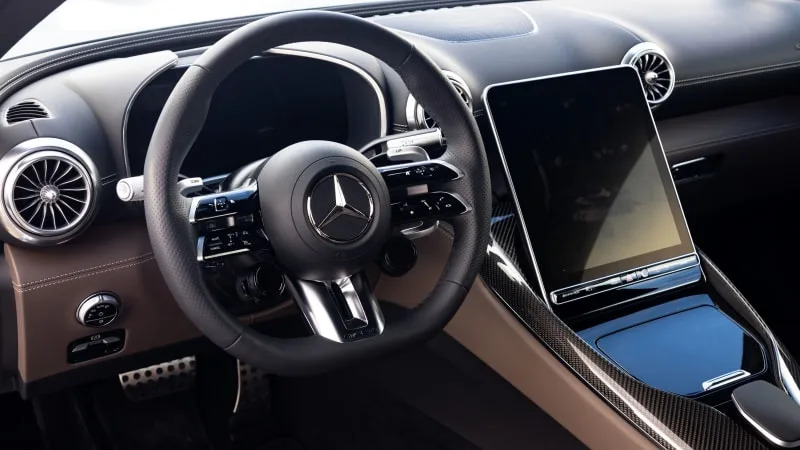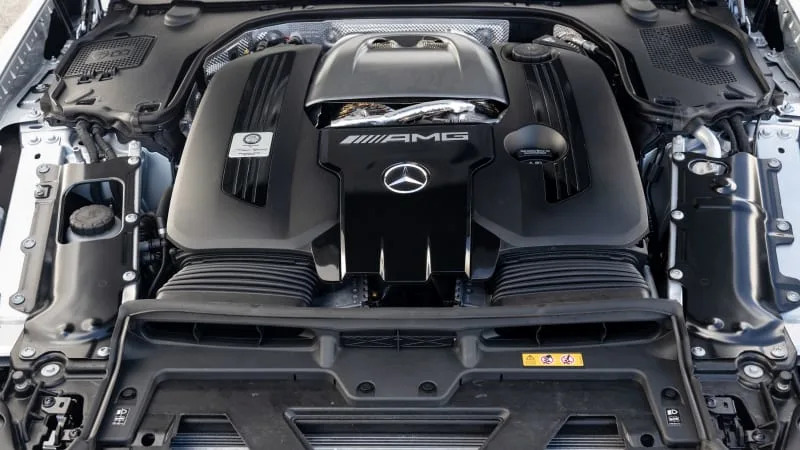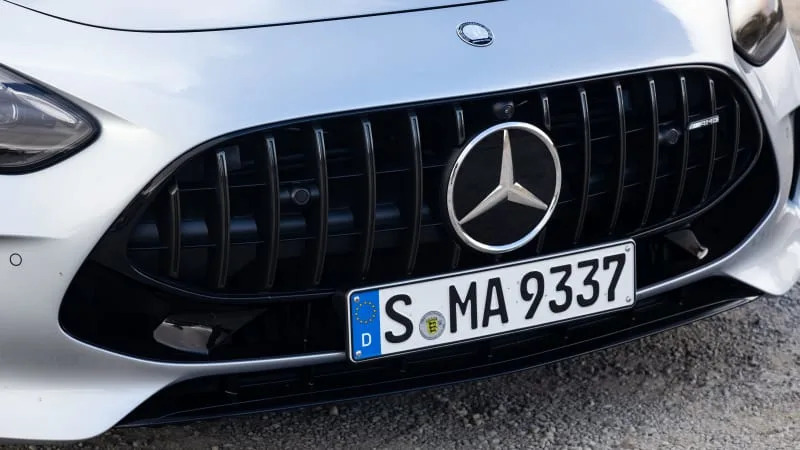GRANADA, Spain — On the first day of the 2024 Mercedes-AMG GT Coupe media drives, I spurred the (genuine two-door) coupe through Spanish mountain roads outside Granada. I’ve spoken before of today’s super sports cars being too much for public roads — 100 pounds of ‘roids in a 20-pound sack. One needs a pressure suit, tower clearance and immunity from prosecution to approach their potential. Well, here is another: an Affalterbach big boy with an afterburner engine, its size and weight uniquely unsuited to humping over spindly Iberian roads with their byzantine zig-zags, their coarse, bumpy tarmac, their numerous, simultaneous cambers and their surprise herds of goats.
Worse, it was as awkward as an NFL offensive tackle asked to flamenco. Its multiplex systems kept me pointed the correct way, but did so by interrupting power delivery and dynamics in ways I couldn’t predict.
There was no way AMG had forgotten how to engineer a sinuous — if portly — driver’s car. I drove a GT in 2016, and other than it being stiffer than a crowbar, it was a hoot to hustle. Colleague James Riswick praised the AMG GT R. The AMG GT Black Series almost never met a heart it couldn’t win.
Enter Katrin, with AMG PR. During dinner that first evening, she asked what I thought of the drive. I did the most polite thing I could think of, answering her question with: “Can I complain?” Then I did just that, and in more detail than outlined above. My TEDx talk concluded, she said, “You need to speak to René.”
That was the beginning of how I learned to delight in the 2024 AMG GT.
But let’s start with the breakdown. The second-generation AMG GT Coupe embodies what the company calls “a new dimension concept.” This means customers wanted back seats for familial and pecuniary reasons — the potential to load kids or tiny dogs, and the real boon of lower insurance rates levied on a 2+2 vs. a two-seater. As a result, the AMG GT can be had as either, albeit with the latter possessing a parcel shelf instead of the vestigial seats.

The all-new coupe combines and distills AMG and Mercedes products that preceded it. The new multi-metal and composite platform shares nothing with the previous AMG GT, but is the same platform supporting the new AMG SL. Compared to the previous GT, the second-gen rides on a wheelbase 2.8 inches longer, its body 7.1 inches longer, and it’s a skosh wider and taller. Compared to the SL, the AMG GT is an inch longer and three inches wider, subtly emphasizing its rowdier purpose.
The exterior playbook cribs the SL’s gameplan, with the SL itself an edited remake of the previous GT C Roadster. Cue AMG’s Panamericana grille, its Mercedes insignia beamed from a dark sun, the long hood and ascending wedge of unfussed bodywork, the flush door handles, 20-inch standard wheels, and quad exhaust finishers. Differences include the three LED light-dot DRL signatures, recalled in back with the three-dot taillights. Four AMG-embossed noisemakers poke through an ornate and aero-efficient diffuser. Larger 21-inch wheels add grip and standoffish bearing, each tire representing the weekly output of a rubber plantation. Oh, and there’s a fixed hardtop.
Inside, there’s all the Mercedes and AMG we expect — architectural elegance (gorgeous Nappa leather seats), technical opulence (extravagantly complex MBUX) and LED ostentation (Cyberpunk 2077 ambient lighting on demand). The big interior story is that there’s more of it: The additional wheelbase and body length relative its predecessor make room for a low shelf behind the front seats in the two-seater, one that would do well with netting or a bar to restrain objects. In the optional 2+2, fold-down second row seats are said to be suitable for anyone no more than 5 feet tall.
In the two-seater, a fixed bulkhead separates cabin from cargo area and 11.3 cubic feet of load space, an improvement on the previous GT’s 10.1 cubic feet. Another sign of AMG’s fastidious detailing, the optional 1,170-watt Burmester audio systems places one of its 15 speakers in the hold in case the owner’s Rimowa luggage also likes yacht rock. Lowering the rear seats in the 2+2 liberates 23.8 cubic feet of cargo space, apparently enough to fit a bicycle without its front wheel.
Powertrains match SL spec, a twin-turbo 4.0-liter V8 in either 63 or 55 trims. The former makes 577 horsepower and 590 pound-feet of torque, the latter, 469 hp and 516 lb-ft. Both shift through AMG’s nine-speed transmission, fitted here with a wet start-off clutch for lower weight and better throttle response. From there, output passes through 4Matic all-wheel drive –the previous generation was rear-drive only. The bookends of the front/rear torque split are a 0/100 pure pusher mode at one end, and a 50/50 spread when lack of rear traction demands all contact patches on deck. Power to the rear wheels runs through a torque-vectoring limited-slip differential additionally aided by brake-based torque vectoring.
There’s a five-link forged aluminum suspension at each corner along with AMG’s Active Ride Control suspension (the system that comes standard on the SL 63, but is an option on the SL 55). The secret sauce is oil, flowing through the hydraulic, semi-active roll control system. Compression and rebound are managed individually at each corner, while a hydraulic pump ahead of the driver’s side rear wheel pumps fluid through lines that connect the suspension across the car, e.g., the compression stage of the front left damper connects to the rebound stage of front right front damper.
The pressure in the system acts on electronic switches that control valving. Separating oil flow from valve actuation permits more precise valve control. All four corners contain a third “comfort” valve, too, which opens to reduce pressure and deliver a smoother ride. The benefit here is the widened spectrum of comfort and performance compared to what a physical torsion element could provide. AMG said the pump operates in a range from 18 bar (least roll resistance, most comfort) to 45 bar (most roll resistance, most performance) in the 2024 AMG GT Coupe. However, the system is capable of 60 bar. The hint is that an even more wicked GT variant this way comes. Eventually.
The “Active” in the name is a bit of a misnomer, though, as this is semi-active roll control. The hydraulics limit roll within programmed limits, they don’t reverse roll. If the coupe’s body leans two degrees through a bend, Active Ride Control cannot restore the coupe to a zero-degree flat aspect.

AMG’s active aerodynamics on the standard car include the Airpanel louvers behind the lower intake that shunt air along the underbody to reduce lift when closed, or open to receive cooling air. As first seen in the aforementioned GT R, a carbon element under the body just in front of the engine drops 1.6 inches at either 50 miles per hour or 62 mph depending on the driving program. The resulting Venturi effect it creates reduces lift in front, creates downforce in back, and lowers drag. The active rear spoiler swings through five positions up to a maximum cant of 22 degrees.
An optional Aerodynamics Package adds small carbon addenda along the body, plus a fixed wing on the decklid that boosts downforce while reducing drag compared to the standard car.
Rear-axle steering comes on every car, able to rotate the back wheels by as much as 2.5 degrees. The standard brake system with steel and aluminum rotors puts six-piston rotors up front clamping 15.4-inch discs, single-piston rotors in back clamping 14.2-inch discs. These are grand for Spanish routes where one is as likely to round a blind hairpin into a wide, ancient view as into a white, ancient Renault cargo van or that herd of goats — possibly all three.
There’s already a ton at work here, and we haven’t cracked open the customizing features available in the AMG driving modes. Pulling the levers doesn’t always result in what an enthusiast would consider winning numbers, though. Thanks to 4Matic, the new coupe’s 54/46 weight balance reverses the former base GT’s 47/53 weight distribution. (The AMG GT Black Series hit the jackpot with a 50/50 balance.)
There’s plenty more weight to be moved around, though: The 2024 AMG GT gains 595 pounds over its predecessor, slapping a scale with 4,353 pounds. On the bright side, that’s merely 58 pounds above a BMW M8 Competition. On the other side, that’s 700 pounds more than a Porsche 911 Turbo S.

With the car’s particulars detailed, let’s get back to Katrin and dinner and complaints about stilted handling, lifeless steering and a wooden brake pedal. She introduced me to René Szczepek, the man in charge of handling dynamics for every AMG product. I’m going to rework roughly 30 minutes of his detailed engineering answers into one paraphrased sentence: AMG essentially stuffed 10 tons of computers into a 2-ton car, and one needs to know how to set the car up to achieve the best results. What I would find out the next day is that one must also not be shy about wringing the snot out of it.
The following morning, René and I took an AMG GT Coupe 2+2 from central Granada to some of the same mountain roads I’d driven. During the 40-minute drive, he delivered a 200-level introductory college course on the AMG Dynamics system the driver uses to tell the car how much rear-end slip he wants — from the none of Basic to the let-it-all-hang-out of Drift — and how the Electronic Stability Programming applies 4Matic, traction control, Active Ride Control, LSD- and brake-based torque vectoring, rear-wheel steer, throttle response, active aero and myriad other mechanical and electronic soldiers to support the driving mission. By the time we reached the point where I’d hop in the passenger’s seat for a demonstration, it began to feel like he was explaining how an F-16 Viper stays in the air. He said there were moments when the vehicle development team needed to backtrack and re-sleuth its own work to figure out which system was performing which intervention. This car is that complex.
Whenever I ride shotgun with a proper pilot, I always tell them to do their best and forget about scaring me. I want the VIP, adults-only show. René — whose car-handling prowess is, as one would expect, outstanding — didn’t wait to give it to me. Within a third of a mile, I was at “Yikes!” A mile down the road, “Holy … Whoa.” Three miles of stupendous handling later: “Wow.” I received another lecture during the drive back to the hotel, where I dropped off Rene. Then I turned around to spend two hours tearing through the Spanish mountains testing setups.
Thing is, the AMG GT Coupe, like the Mercedes-AMG Petronas F1 W14 or the F14 Tomcat, gets staggeringly better the faster you drive it. Around town, it’s still firm, but far more comfortable than the previous GT. Wring its neck, and it plucks a tool or four out of its massive dynamic tool chest to get around every corner at speed. The hydraulic roll control injects just enough pitch and roll to feel natural, while checking the sway and oscillations that slowly fatigue one’s neck and shoulders. Pushed as if on a qualifying lap, the GT feels half a ton lighter — or, at least, it responds like a car weighing a thousand pounds less. Steering and braking still lack communication but abound in precision — a fair compromise at the speeds the GT Coupe will do through a corner. Michelin Pilot Sport S 5 tires sized 295/30 in front and 305/30 in back, on 21-inch wheels, refused to be dislodged beyond their software-defined limits. And AMG engineers even lowered the frequency and intensity of ABS pulsing so as not to jolt drivers at crucial moments.
It doesn’t respond well to tentative driving, as if the computers just don’t know how to help a reticent drive. So, in between extremes, such as when driving like you’re trying to take its measure on mysterious foreign roads at the same time you’re trying not risk the lives of your journalist passenger or a goatherd around another blind corner, the GT Coupe loses much of its grace — likely while one of its computers curses you in German and another makes a notation in the Mercedes Me cloud that the driver is a chump.
This isn’t a Porsche 911, nor is it a BMW M8. It is, in every way, from the diamond-quilted seats and Burmester audio to its multiple PhD-level computer science degrees and V8 bell and howl, an AMG. And it’s the best everyday non-Black Series AMG GT Coupe there’s ever been.
We hope the next one is launched with one-on-one instruction in setup, though. And at a track, too. Because prosecution. And goats.
Related video:











